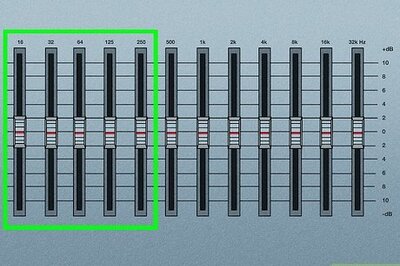
views
Creating a New Will

Format your will. You can easily revoke a will by drafting a new one that includes a statement that you wish to revoke any previous wills. Use whatever forms or computer software that you used when creating your original will. At the top of the will, include a title like the following: “Last Will and Testament of Coby T. Clark, August 1, 2016.” Remember to include the date to show it comes after any prior wills or codicils. The date should be the date you execute the will.

State you are revoking prior wills. For example, you can write, “I revoke all wills and codicils I have previously made.” Including a statement like this is critical if you want any previous wills to be legally revoked.

Name new beneficiaries. You can leave your property to whoever you want. Remember to name alternate beneficiaries in case the original dies before you. For example, you can leave your sports car to your brother and, if he dies before you, to your nephew. If all you want to do is change beneficiaries, then you don’t need to draft an entirely new will. Instead, you could have simply made changes to your will with a codicil.

Identify your executor. You can choose a new executor or keep the same one that you had in your original will. Remember to name alternate executors in case the original ones cannot serve.

Consult with an attorney. You can draft a new will without a lawyer’s help, especially if your estate is simple. However, you should probably meet with an estate planning attorney if your estate is large or complicated. You can get a referral by contacting your nearest bar association. Also consult with an attorney if you are leaving assets to a minor child or to someone who is disabled. You might want to use a trust instead of a will. Even if your will is simple, you’ll benefit by running your draft by a lawyer. Ask if anything is missing.

Execute the will. You’ll need to follow your jurisdiction’s formalities. For example, in the U.S., you’ll need to sign and date the will in front of two witnesses, who will also need to sign the will. Make sure your witnesses are not inheriting anything from you in the will. Depending on your jurisdiction, you might also need to sign the will in front of a notary public.

Distribute copies. Give your new will to whoever had copies of your old will. Generally, people give the original to their lawyer or, if they don’t have a lawyer, they keep it in a safe deposit box or home safe. You might give a copy to your executor and keep a copy in your home. Don’t destroy copies of your old will. Instead, write “Revoked, superseded by will dated [insert date]” on each page.
Using a Codicil to Revoke the Will

Be sure you don’t want to simply change your will. You might want to change the beneficiary for some pieces of property. In this situation, you don’t need to revoke the will. Instead, you can amend your current will, which is a different process. If you die without a will, then the state will determine who receives your property. You can read your state’s intestacy laws to see who will inherit your property.

Format your codicil. You can use a codicil if you want to revoke your will without drafting an entirely new one. Set it up like you would a will. You can find sample codicils or templates online or in books of legal forms. Title your codicil something like, “Codicil to Last Will and Testament of Coby T. Clark.”

State that you are revoking your will. Be sure to identify the will you are revoking. For example, you can write, “I am revoking my Last Will and Testament dated August 1, 2016.” You might have multiple wills and amendments out there. You should revoke all of them by writing, “I revoke all wills and codicils I have previously made.”

Execute the codicil as you would a will. If your codicil is revoking all or part of your will, you will need to treat it essentially as a new will. Therefore, you will need to execute it using the same formalities that you did when you executed the original will. Typically, you’ll need to sign the codicil in front of at least 2 witnesses and provide proof of testamentary capacity (sound mind).

Attach the codicil to all copies of the will. You can staple it to the old will so that they are bound permanently together. Keep the original codicil with your original version of the will, and distribute copies to anyone with a copy of the will.
Revoking a Will by Destroying It

Find all copies. Legally, you can revoke a will by destroying it. However, there might be copies floating around out there. Courts typically don’t admit copies of wills into probate, but more judges seem to be doing just that. For this reason, you need to find all copies so that you can destroy them. Your lawyer might have a copy, as well as the person you named to be your executor. Tell them you are revoking your will and ask for it back. You might also have a copy stored in a safe, safe deposit box, or a filing cabinet at home or at work.

Destroy the will thoroughly. You can shred it, burn it, or tear it into pieces. However, you should make sure to destroy the entire will, or at least any parts that you want revoked. If all you do is put an X on several pages, then a court might not think you revoked the entire will. Also don’t write “revoked” on the will and call it a day. No one will know whether you revoked the will or whether one of your children has tried to revoke the will by writing on it. You can also have someone else destroy the will at your direction. However, you should be present when the will is destroyed. While you don’t necessarily have to destroy the will completely, you must do enough to make the parts you want revoked completely illegible. Any parts of the will that are not destroyed may remain effective.

Tell people you have destroyed it. Let everyone know that you have revoked your will and that it is now destroyed. A will is not revoked if it is accidentally lost or destroyed, so you must make it clear that you destroyed it intentionally. You want to protect against someone coming forward with a copy. For the revocation to be legal, you must both declare your intention to destroy the will and actually destroy it. In some cases, if a last will cannot be found after the testator’s death, it will be presumed intentionally destroyed. If you’re concerned that destroying your will is not enough, write a new will revoking the old one.
Revoking a Will by Operation of Law
Look up the laws in your area regarding wills and marital status. In some places, a change in legal status such as divorce, annulment, or new marriage can result in some or all of a will being automatically revoked. In some cases, having children can also cause a will to be revoked. Check the laws regarding wills and marital status in your state, province, or jurisdiction. For example, in Illinois, parts of a will pertaining to the testator’s spouse or domestic partner can be revoked in the event of a divorce or annulment. However, a new marriage will not revoke a previously written will.
Take the date of your will into account. Even if the laws in your area have recently changed, the laws that were in place at the time your will was executed may still apply. Consult with a lawyer or judge to find out for sure how your will may have been affected by divorce, annulment, a new marriage, or the birth of a child.
Re-execute your will, if necessary. If you find out that your will has been completely or partially revoked through operation of law, you will need to re-execute your will or write a new one. If you die without re-executing or creating a new will, you will be considered intestate (to have died without a will). Different states, provinces, or other legal jurisdictions have different intestacy laws. Look up the intestacy laws in your area to find out how your property will be distributed if you do not re-execute your will.




















Comments
0 comment